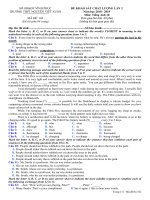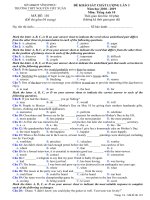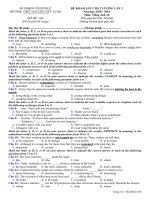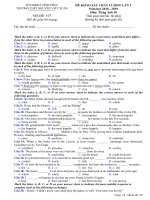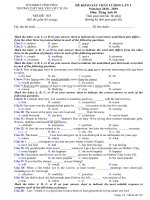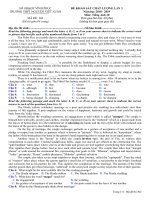Đề thi KSCL lớp 12 Tiếng Anh Nguyễn Viết Xuân, Vĩnh Phúc 2019 lần 3 - Mã đề 206 - Học Toàn Tập
Bạn đang xem bản rút gọn của tài liệu. Xem và tải ngay bản đầy đủ của tài liệu tại đây (227.93 KB, 5 trang )
<span class='text_page_counter'>(1)</span><div class='page_container' data-page=1>
<b>SỞ GD&ĐT VĨNH PHÚC </b>
<b>TRƯỜNG THPT NGUYỄN VIẾT XUÂN </b>
( Đề thi có 5 trang)
Mã đề: 206
<b>ĐỀ KHẢO SÁT CHẤT LƯỢNG THPT QUỐC GIA LẦN 3 </b>
<b>NĂM HỌC 2018 – 2019 </b>
<b>MÔN: TIẾNG ANH 12 </b>
<i>Thời gian làm bài: 60 phút;50 câu trắc nghiệm </i>
<i>(Thí sinh khơng được sử dụng tài liệu)</i>
Họ, tên thí sinh:... SBD: ...
<i><b>Read the following passage and mark the letter A, B, C, or D on your answer sheet to indicate the </b></i>
<i><b>correct answer to each of the questions from 1 to 7. </b></i>
There is a common expression in the English language referring to a blue moon. When people say that
something happens "only once in a blue moon",they mean that it happens only very rarely, once in a great
while. This expression has been aruond for at least a century and a half; there are line references to this
expression that date from the second half of the nineteenth century.
The expression "a blue moon" has come to refer to the second full moon occurring in any given
calendar month. A secon full moon is not called a blue moon because it is particularly blue or is any
different in hue from the first full moon of the month. Instead, it is called a blue moon because it is so
rare. The moon needs a little more than 29 days, every month will have at least moon. Because every
month except February has more than 29 days, every month will have at least one full moon (except
February, which will have a full moon unless there is a full moon at the end og January and another full
moon at the very beginning of March). It is on the occasion when a given calendar month has a second
full moon that a blue moon occurs. This does not happen very often, only three or four times in a decade.
The blue moons of today are called blue moons because of their rarity and not because of their
color, however, the expression "blue moon" may have
<b>come into existence in reference to unusual </b>
circumstances in which the moon actually appeared blue. Certain natural phenomena of gigantic
proportions can actually change the appearance of the moon from Earth. The eruption of the Krakatau
volcano in 1883 left dust particles in the atmosphere, which clouded the sun and gave the moon a bluish
<b>tint. This particular occurrence of the blue moon may have given rise to the expression that we use today. </b>
Another example occured more than a century later. When Mount Pinatubo erupted in the Philipines in
1991, the moon again took on a blue tint.
<b>Câu 1:</b>
According to paragraph 2, the second full moon is called “the blue moon” because ______.
<b>A. </b>
it is bluer than the first full moon
<b>B. </b>
it has a bluish hue
<b>C. </b>
it appears on unhappy days
<b>D. </b>
it is infrequent
<b>Câu 2:</b>
If one full moon is on the second of May, another one will probably on ______.
<b>A. </b>
June 1
st<b>B. </b>
May 30
th<b>C. </b>
May 31
st<b>D. </b>
June 2
nd<b>Câu 3:</b>
It can be infered from the passage that ______.
<b>A. </b>
the occaision of the blue moon happens every four years
<b>B. </b>
natural activities on Earth can alter the look of the moon
<b>C. </b>
the expression “once in blue moon” is used only when blue moon appears
<b>D. </b>
the blue moon is bigger but darker than the first full moon
<b>Câu 4:</b>
The phrase “come into existence” in paragraph 3 can be best replaced by “______”.
<b>A. </b>
been overlooked
<b>B. </b>
associated
<b>C. </b>
comprised
<b>D. </b>
been created
<b>Câu 5:</b>
In paragrahp 2, the word “which” refers to _______.
<b>A. </b>
the eruption
<b>B. </b>
the cloud
<b>C. </b>
the dust particles
<b>D. </b>
the Krakatao volcano
<b>Câu 6:</b>
The word “tint” in paragraph 3 mostly means “______”.
<b>A. </b>
light
<b>B. </b>
shade
<b>C. </b>
blur
<b>D. </b>
surface
<b>Câu 7:</b>
The author is trying to ______.
<b>A. </b>
predict when a lue moon will happen
</div>
<span class='text_page_counter'>(2)</span><div class='page_container' data-page=2>
<i><b>Read the following passage and mark letter A, B, C, or D on your answer sheet to indicate the correct </b></i>
<i><b>answer to each of the questions from 8 to 15. </b></i>
Experts in climatology and other scientists are becoming extremely concerned about the changes to
our climate which are taking place. Admittedly, climate changes have occurred on our planet before. For
example, there have been several ice ages or glacial periods. These climatic changes, however, were
different from the modern ones in that they occurred gradually and, as far as we know, naturally. The
changes currently being monitored are said to be the result not of natural causes, but of human activity.
Furthermore, the rate of change is becoming alarmingly rapid.
The major problem is that the planet appears to be warming up. According to some experts, this
warming process, known as global warming, is occurring at a rate unprecedented in the last 10,000 years.
The implications for the planet are very serious. Rising global temperatures could give rise to such
ecological disasters as extremely high increases in the incidence of flooding and of droughts. These in
turn could have a harmful effect on agriculture.
It is thought that this unusual warming of the Earth has been caused by so-called greenhouse
gases, such as carbon dioxide, being emitted into the atmosphere by car engines and modern industrial
processes, for example. Such gases not only add to the pollution of the atmosphere, but also create a
greenhouse effect, by which the heat of the sun is trapped. This leads to the warming up of the planet.
Politicians are also concerned about climate change and there are now regular summits on the
subject, attended by representatives from around 180 of the world’s industrialized countries. Of these
summits, the most important took place in Kyotoin Japanin 1997.
<b>There it was agreed that the most </b>
industrialized countries would try to reduce the volume of greenhouse gas emissions and were given
targets for this reduction of emissions.
It was also suggested that more forests should be planted to create so-called sinks to absorb
greenhouse gases. At least part of the problem of rapid climate change has been caused by too drastic
deforestation. Sadly, the targets are not being met. Even more sadly, global warnings about climate
changes are often still being regarded as scaremongering.
<b>Câu 8:</b>
According to the passage, in what way did the climate changes in the ice ages differ from the
modern ones
<b>A. </b>
They occurred naturally over a long period of time
<b>B. </b>
They were partly intended.
<b>C. </b>
They were fully monitored by humans.
<b>D. </b>
They were wholly the result of human activity.
<b>Câu 9:</b>
The word “alarmingly” in paragraph 2 is closest in meaning to ______.
<b>A. </b>
disappointingly
<b>B. </b>
worryingly
<b>C. </b>
surprisingly
<b>D. </b>
disapprovingly
<b>Câu 10:</b>
According to the passage, agriculture could ______.
<b>A. </b>
give rise to many ecological disasters
<b>B. </b>
be indirectly affected by the global temperature rises
<b>C. </b>
make the global warming more serious
<b>D. </b>
be directly damaged by the rises in global temperature
<b>Câu 11:</b>
Greenhouse gases cause the warming up of the Earth because they ______.
<b>A. </b>
are emitted by car engines
<b>B. </b>
are unusual gases
<b>C. </b>
do not add to atmosphere pollution
<b>D. </b>
trap heat from the sun
<b>Câu 12:</b>
According to the passage, 1997 witnessed ______.
<b>A. </b>
the most important summit on climate change taking place in Kyoto, Japan
<b>B. </b>
the largest number of summits on the subject of climate change
<b>C. </b>
the highest attendance by representatives from 180 industrialised countries
<b>D. </b>
widespread concern about climate change
<b>Câu 13:</b>
It can be inferred from the passage that the countries which are mainly responsible for global
warming are ______.
</div>
<span class='text_page_counter'>(3)</span><div class='page_container' data-page=3>
<b>Câu 14:</b>
The word “There” in paragraph 5 refers to ______.
<b>A. </b>
the 1997 summit in Kyoto, Japan
<b>B. </b>
regular summits on climate change
<b>C. </b>
the most industrialized countries
<b>D. </b>
the world’s industrialized countries
<b>Câu 15:</b>
Which of the following is NOT true, according to the passage?
<b>A. </b>
The so-called sinks created by forests can absorb greenhouse gases.
<b>B. </b>
The problem of rapid climate change has been caused mainly by deforestation
<b>C. </b>
Carbon dioxide is one of the gases that may cause the so-called greenhouse effect.
<b>D. </b>
Politicians are among those who are concerned about climate change
<i><b>Mark the letter A, B, C, or D on your answer sheet to indicate the word OPPOSITE in meaning to the </b></i>
<i><b>underlined word in each of the following questions from 16 to 17. </b></i>
<b>Câu 16:</b>
Doctors have been criticized for their indiscriminate use of antibiotisc.
<b>A. </b>
selective
<b>B. </b>
wholesale
<b>C. </b>
unconscious
<b>D. </b>
disciplined
<b>Câu 17:</b>
I think we can safely say nowthat we have got our money back, we are home and dry.
<b>A. </b>
have been successful
<b>B. </b>
have been unsuccessful
<b>C. </b>
have got no water
<b>D. </b>
have got home dry
<i><b>Mark the letter A, B, C, or D on your answer sheet to indicate the word that differs from the other three </b></i>
<i><b>in the position of primary stress in each of the following questions from 18 to 19. </b></i>
<b>Câu 18: </b>
<b>A. </b>
amarteurish
<b>B. </b>
minority
<b>C. </b>
photography
<b>D. </b>
appearances
<b>Câu 19: </b>
<b>A. </b>
brighten
<b>B. </b>
invent
<b>C. </b>
machine
<b>D. </b>
provide
<i><b>Read the following passage and mark A, B, C, or D to indicate the correct answer to each of the blanks </b></i>
<i><b>from 20 to 24. </b></i>
Water is of vital importance to all living things. Without it, all living things will surely die. We also
use a great (20) ______ of water daily in our homes, in factories, and in power stations. Most of this water
is fresh water and it comes to us from reservoirs, rivers and lakes.
The Earth's surface is (21) ______ by large areas of water which we call oceans and seas.If you have
tasted the water from the sea, you will know that, unlike fresh water, seawater tastes salty. This is due to
the (22)______of sodium chloride which comes from the land. Rivers carry it to the sea.
Although neither salt nor fresh water has any color, the sea often looks blue (23)______the sunlight.
The reason is that sunlight is made up of many colors. Some colors disappear quickly inthe sea but blue
light bounces back, or is reflected, to the surface. This makes the sea look blue. (24) ______, a stormy sky
will make the sea look grey.
(Conquer Cloze — Judy Tilaka & Charles Xavier — SAP)
<b>Câu 20: </b>
<b>A. </b>
measure
<b>B. </b>
quality
<b>C. </b>
amount
<b>D. </b>
number
<b>Câu 21: </b>
<b>A. </b>
reserved
<b>B. </b>
covered
<b>C. </b>
constructed
<b>D. </b>
included
<b>Câu 22: </b>
<b>A. </b>
presence
<b>B. </b>
attraction
<b>C. </b>
advantage
<b>D. </b>
influence
<b>Câu 23: </b>
<b>A. </b>
in
<b>B. </b>
within
<b>C. </b>
of
<b>D. </b>
with
<b>Câu 24: </b>
<b>A. </b>
Consequently
<b>B. </b>
However
<b>C. </b>
Hence
<b>D. </b>
Therefore
<i><b>Mark the letter A, B, C, or D on your answer sheet to indicate the correct answer to each of the </b></i>
<i><b>following questions from 25 to 36. </b></i>
<b>Câu 25:</b>
If I had gone to the party last night, I _________tired now.
<b>A. </b>
would have been
<b>B. </b>
would be
<b>C. </b>
am
<b>D. </b>
were
</div>
<span class='text_page_counter'>(4)</span><div class='page_container' data-page=4>
<b>A. </b>
their cars be serviced
<b>B. </b>
get their cars to serviced
<b>C. </b>
get their cars serviced
<b>D. </b>
service their cars
<b>Câu 28:</b>
You could ride a bicycle when you were five, _________?
<b>A. </b>
hadn't you
<b>B. </b>
didn't you
<b>C. </b>
couldn’t you
<b>D. </b>
weren't you
<b>Câu 29:</b>
Look! The ground is wet. It ________ last night.
<b>A. </b>
must rain
<b>B. </b>
couldn’t have rained
<b>C. </b>
must have rained
<b>D. </b>
should have rained
<b>Câu 30:</b>
My uncle has a large collection of antiques, many of ________ are values.
<b>A. </b>
which
<b>B. </b>
that
<b>C. </b>
who
<b>D. </b>
what
<b>Câu 31:</b>
There is no danger in using this machine as long as you ________ to the safety regulations.
<b>A. </b>
observe
<b>B. </b>
abide
<b>C. </b>
comply
<b>D. </b>
adhere
<b>Câu 32:</b>
He managed to finish his thesis under the ________ of his tutor.
<b>A. </b>
assistances
<b>B. </b>
help
<b>C. </b>
guidance
<b>D. </b>
aid
<b>Câu 33:</b>
It's about time you________ harder for the exam.
<b>A. </b>
work
<b>B. </b>
worked
<b>C. </b>
have worked
<b>D. </b>
are working
<b>Câu 34:</b>
The president _________ tribute to all people who had supported him
<b>A. </b>
gave
<b>B. </b>
paid
<b>C. </b>
returned
<b>D. </b>
made
<b>Câu 35:</b>
The man asked me ________ in English.
<b>A. </b>
what that word means
<b>B. </b>
what did this word mean
<b>C. </b>
what that word meant
<b>D. </b>
what does this word mean
<b>Câu 36:</b>
She is a wonderful teacher. We all ________ her.
<b>A. </b>
look up to
<b>B. </b>
put up with
<b>C. </b>
face up to
<b>D. </b>
watch out for
<i><b>Mark the letter A, B, C, or D on your answer sheet to indicate the word whose underlined part differs </b></i>
<i><b>from the other three in pronunciation in each of the following questions from 37 to 38. </b></i>
<b>Câu 37: </b>
<b>A. </b>
yield
<b>B. </b>
friend
<b>C. </b>
series
<b>D. </b>
field
<b>Câu 38: </b>
<b>A. </b>
walked
<b>B. </b>
booked
<b>C. </b>
cooked
<b>D. </b>
naked
<i><b>Mark the letter A, B, C or D in your answer sheet to indicate the underlined part that needs correction in each of </b></i>
<i><b>the following questions </b></i>
<i><b>from 39 to 41. </b></i>
<b>Câu 39:</b>
For thousands of years, man has created sweet-smelling substances from wood, herbs, and
flowers and using them for perfume or medicine.
<b>A. </b>
or
<b>B. </b>
sweet-smelling
<b>C. </b>
man
<b>D. </b>
using them
<b>Câu 40:</b>
Neither of the girls have turned in the term papers to the instructor yet.
<b>A. </b>
turned in
<b>B. </b>
have
<b>C. </b>
yet
<b>D. </b>
girls
<b>Câu 41:</b>
Mercury and alcohol are widely used in thermometers because their volume increases uniform
with temperature.
<b>A. </b>
uniform with
<b>B. </b>
in
<b>C. </b>
their volume
<b>D. </b>
widely
<i><b>Mark the letter A, B, C, or D on your answer sheet to indicate the sentence that is closest in meaning to </b></i>
<i><b>each of the following questions from 42 to 44. </b></i>
<b>Câu 42:</b>
The last time when I met John was four years ago.
<b>A. </b>
I have not met John for four years.
<b>B. </b>
About four years ago,I used to meet her.
<b>C. </b>
I have often met John for the last four years.
<b>D. </b>
I met John four years ago and will never meet him again.
<b>Câu 43:</b>
“You’d better spend more time learning to write,?” my friend said to me.
<b>A. </b>
My friend didn’t want me to spend more time learning to write.
</div>
<span class='text_page_counter'>(5)</span><div class='page_container' data-page=5>
<b>C. </b>
My friend stopped me from spending more time learning to write.
<b>D. </b>
My friend advised me to spend more time learning to write.
<b>Câu 44:</b>
The newspaper reports that James was awarded the first prize.
<b>A. </b>
It is reported that James wins the first prize.
<b>B. </b>
James is reported to have been awared the first prize.
<b>C. </b>
It is reported that James to be awarded to first prize.
<b>D. </b>
The first prize is reported to award to James.
<i><b>Mark the letter A, B, C, or D on your answer sheet to indicate the most suitable response to complete </b></i>
<i><b>each of the following exchanges from 45 to 46. </b></i>
<b>Câu 45:</b>
Mary: “ How do you like your steak?” Anna: “ _______”.
<b>A. </b>
Very little
<b>B. </b>
I don’t like it
<b>C. </b>
Very much
<b>D. </b>
Well- done
<b>Câu 46:</b>
Peter: “ Can I do this for you?” Ann: “________”.
<b>A. </b>
No, you can’t
<b>B. </b>
You’re welcome
<b>C. </b>
It’s alright, thanks
<b>D. </b>
Of course not
<i><b>Mark the letter A, B, C, or D on your answer sheet to indicate the word CLOSEST in meaning to the </b></i>
<i><b>underlined word in each of the following questions from 47 to 48. </b></i>
<b>Câu 47:</b>
The National Institute of Mental Health is conducting
<b>far- reaching research to determine the </b>
psychology effects of using drugs.
<b>A. </b>
refined
<b>B. </b>
tentative
<b>C. </b>
prevalent
<b>D. </b>
extensive
<b>Câu 48:</b>
Due to a scarity of water, a rationing plan was established.
<b>A. </b>
supply
<b>B. </b>
vacancy
<b>C. </b>
shortage
<b>D. </b>
sufficiency
<i><b>Mark the letter A, B, C, or D on your answer sheet to indicate the sentence that best combines each </b></i>
<i><b>pair of sentences in the following questions from 49 to 50. </b></i>
<b>Câu 49:</b>
He is very intelligent. He can solve all the problems in no time.
<b>A. </b>
So intelligent a student is he that he can solve all the problems in no time.
<b>B. </b>
An intelligent student is he that he can solve all the problems in no time.
<b>C. </b>
So intelligent is he that he can solve all the problems in no time.
<b>D. </b>
He is very intelligent that he can solve all the problems in no time.
<b>Câu 50:</b>
The hill is treeless now. It housed a big forest only two years ago.
<b>A. </b>
The hill to house a big forest only two years ago, is treeless now.
<b>B. </b>
The hill housed a big forest only two years ago is treeless now.
<b>C. </b>
The hill who housed a big forest only two years ago, is treeless now.
<b>D. </b>
The hill housing a big forest only two years ago is treeless now.
---
</div>
<!--links-->

